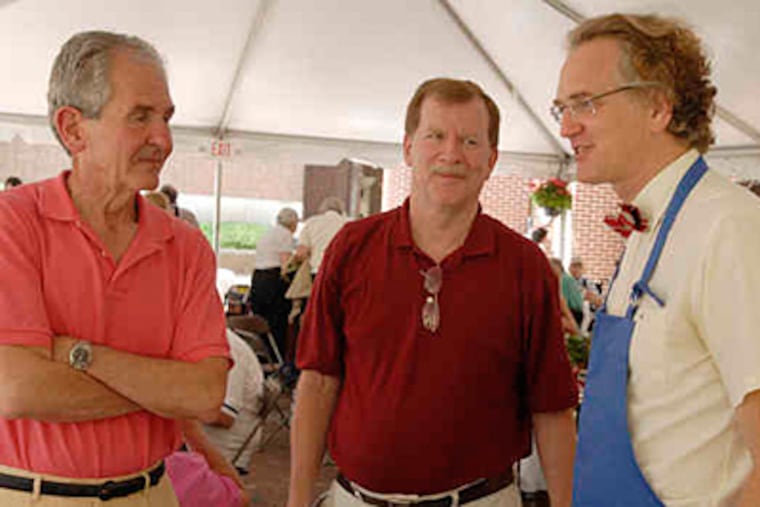Parkinson's patients gather with doctor who helped
For Mark Helms, the tremors of Parkinson's disease became so bad eight years ago that he was having difficulty doing the most basic things - brushing his teeth, shaving, or holding a cup of coffee.

For Mark Helms, the tremors of Parkinson's disease became so bad eight years ago that he was having difficulty doing the most basic things - brushing his teeth, shaving, or holding a cup of coffee.
Then the 60-year-old former radio news director underwent surgery to have two electrodes implanted in his brain and attached by wires to battery-powered electric stimulators in his chest.
The procedure, known as deep brain stimulation, or DBS, was performed by neurosurgeon Gordon Baltuch at Pennsylvania Hospital. Baltuch is among the most experienced surgeons in the nation performing the operation to treat the symptoms of Parkinson's and other movement disorders.
"You don't really appreciate something until you can't do it," Helms said. "Drinking a cup of coffee without shaking is big. . . . DBS does a lot. It stopped the tremors and gave me my life back."
On Saturday, Helms and 74 of Baltuch's more than 600 DBS patients gathered at the hospital to share their experiences and show their support for the operation, which does not cure the disease or stop its deadly progression.
"I think I have kept a lot of people out of nursing homes," said Baltuch, who performs about 70 of the procedures a year. "By manipulating the brain's circuitry with a stimulator, you can profoundly impact a patient's neurological function."
But it is brain surgery, with all the dangers and risks of serious side effects that entails, including infections, deadly hemorrhages, and strokes.
More than half of DBS patients experienced "adverse events" ranging from headaches and speech problems to infections and death, according to a study published Thursday in the New England Journal of Medicine.
Still, for Parkinson's patients such as Helms of Lafayette Hill and Charles Maddock of Wayne, who had DBS on March 29, those risks were worth taking.
"If I can get five to eight good years out of this, I am very confident that there will be a cure by then," said Maddock, 64.
In the meantime, DBS has made a huge difference in his life. He can now make the three-hour drive to Washington, where his first grandchild was born Wednesday. Even more important, his eyes, which had been unable to stay still for more than a couple of seconds at a time, are now steadied so he can gaze upon the baby girl.
Besides the classic tremors or shaking, Parkinson's patients often experience stiffness or muscle rigidity, difficulty with small-motor movements such as when buttoning a shirt, constipation, and problems swallowing.
While most can be treated with medications, many experience side effects. Those can include uncontrolled movements that can be as challenging as Parkinson's tremors.
Baltuch called that the "roller-coaster" effect that many patients experience with the medications. DBS can smooth out that up-and-down cycle and even reduce the amount of medications a patient needs and, in some cases, eliminate them altogether.
Still, because of the possible complications - and since DBS is an elective procedure that does not cure the underlying disease - Baltuch said it was critical that patients be carefully selected.
"Maybe 10 percent of patients [with Parkinson's] are candidates for this surgery," he said. "Most patients are treated well with the medications."
The surgery can be hard.
Patients are sedated, but awake, so Baltuch and his team can identify the correct location for the electrodes. He is aiming for a Rice Krispies-size mass - either the subthalamic nucleus or the globus pallidus - in the brain's basal ganglia system.
Using local anesthesia, the doctor makes an incision along the scalp and a dime-size hole is drilled in the middle of the patient's skull.
Baltuch then feeds the electrode wire slowly through the brain.
He uses X-rays and audio signals - Baltuch listens to the signals given off by the brain cells - to find the right spot.
He said he can recognize different brain cells by the sound they give off.
"It's like a song, and you begin to recognize the song over time," he said. "Your ear is a very good spectral analyzer."
Baltuch said 70 percent of the time it takes just one attempt to hit the correct location, but in some cases he needs two, three, or even four tries.
The patient is then brought out of sedation and the electrode is turned to make sure the tremors have stopped - proof positive that Baltuch hit his target.
He then repeats the process with a second electrode on the other side of the brain. After both are in place, the patient is put under general anesthesia so the wire can be fed under the skin to battery-operated stimulators implanted in the patient's chest.
On Saturday, with his monogrammed short-sleeve shirt and gray linen slacks covered by a blue apron, Baltuch thanked the patients for participating with him in the effort to remake the treatment of Parkinson's until a cure is found. So far, he noted, about 60,000 patients have undergone DBS worldwide.
"I'm one of them," Albert Civelli, 45, of Plymouth Meeting, said quietly from his seat next to his wife and two sons. For Civelli, DBS means he can continue to work as a forklift operator.
But less than 3 percent of the 150,000 eligible U.S. patients have undergone the procedure. He urged the patients to talk with others about their experiences.
"Talk to them about what you've gone through," he suggested, "the good, the bad, everything."